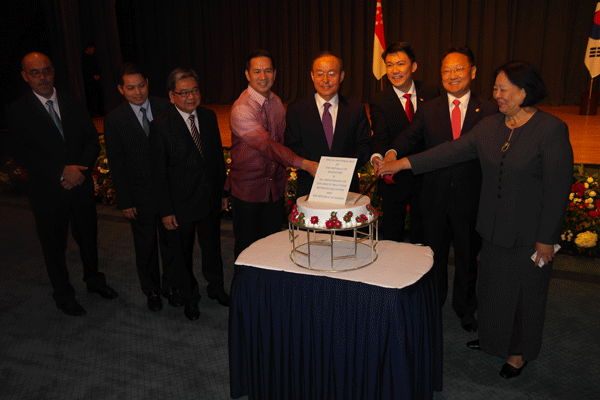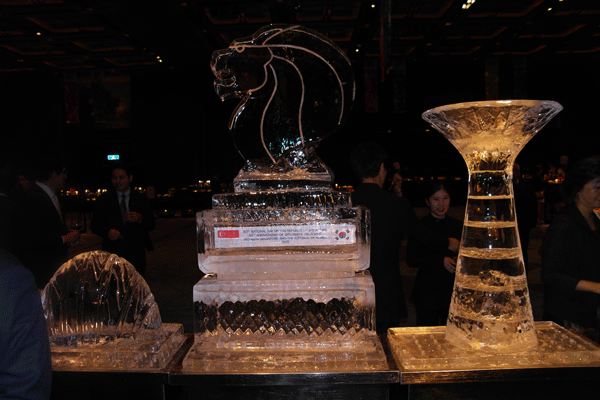Singapore marks 50th National Day, 40th diplomatic anniversary
Ambassador Yip Wei Kiat of Singapore of the Republic of Singapore hosted a reception at the Grand Hyatt Grand Ballrom in Seoul on Aug. 12, 2015 to celebrate Singapore’s 50th National Day and the 40th anniversary of her diplomatic relations with Korea.
It was one of the largest diplomatic functions in recent months in terms of the space of the ballroom whereas the Grand Ballroom of Grand Hyatt was among the largest in the Capital.

Many Korean and international dignitaries attended the party, who, from the Korean side, included Minister Yoo Il-ho of the Land Infrastructure & Transpiration (MOLINT) and President Song Minsoon of the University of North Korean Studies (former minister of foreign affairs & trade during the government of President and Roh Moo-hyun) and many business, culture and media representatives who included Chairman Lee Kyung-sik of The Korea Post who operates three English and two Korean-language media units.
Attendance from the international community was also adequate and included mission chiefs who included Ambassadors William Paterson of Australia, Ramzi Teymurov of Azerbaijan, Guadalupe Palomeque de Taboada of Bolivia, Dato Paduka Haji Modh Rosli Bin Haji Sabtu of Brunei Darussalam, Petar Andonov of Bulgaria, Suth Dina of Cambodia, Sylvestre Kouassi Bile of Cote d'Ivoire, Hany Moawad Selim Labib of Egypt, Bessho Koro of Japan, Dato Rohana binti Ramli of Malaysia, Clare Patricia Fearnley of New Zealand, Mohamed Salim Alharthy of Oman, Raul S. Hernandez of the Philippines, Alexander Andreevich Tomonin of Russia, Zoran Kazazovic of Serbia, Omrie Michael Golley of Sierra Leone, Kiromov Salohiddin of Tajikistan (CDA), Myrat Mammetalyyev of Turkmenistan, Alba Florio Legnani of Uruguay and Botirjon Asadov of Uzbekistan.
Speaking to the guests, Ambassador Yip said:
“Many people have been impressed by the progress that Singapore has achieved over the last 50 years. Since 1965, Singapore’s per-capita GDP has grown around 100 times. In fact, Korea’s own transformation has been no less spectacular. Over the same period, its per-capita GDP has grown by more than 260 times. Singapore and Korea have been strong partners in our journey to where we are today.
“In 1997, we signed an agreement on science and technology, which has since become a key pillar of bilateral cooperation. Ten years ago, we concluded a bilateral FTA to give two-way trade and investment a boost. Today, Singapore is Korea’s 5th largest trade partner and among its top few foreign investors. And despite being a small country, Singapore is one of the largest markets for Korean engineering and construction companies. Apart from building roads, subways and sea-port terminals, companies such as Samsung C&T, Hyundai E&C, Samsung E&C and Daewoo E&C have also left their mark on the Singapore landscape in the form of iconic buildings such as the Marina Bay Sands and the Suntech City.”

Korea and Singapore now appear to be interested in cooperation in the construction of speed train connecting Singapore and Malaysia. Korea is considered in the outside world to be very competitive in the construction of speed trains in view of its construction and operation experiences in Korea and around the world..
Incidentally, Second Vice Minister Yeo Heyong-koo of the MOLIT visited Singapore and Malaysia last May to persuade the two countries that Korea stood out in the construction of speed trains in connection with the plans of the two countries build an express train line between Singapore and Malaysia. The Tuas West project is known to cover a total of 330km between the two countries and total cost of construction is estimated at US$12 billion, according to an MOLIT source.
On the private note, among the Korean people, Singapore is a target of great envy. If the late President Park Chung-hee (father of incumbent President Park Geun-hye) achieved economic miracles in Korea, former President Lee Kwan Yew of Singapore made a much greater achievement in the eyes of the many Koreans, from which conspicuously stands out the high transparency rating and the per-capita GNI (gross national income).
Last year, Singapore ranked the seventh cleanest country in the world (among a total of 175 countries) according to Transparency International while Korea was the 43d among the same number of countries.
The transparency rating more or less corresponds to the per-capita GNI. Last year, according to IMF, Singapore achieved US$56,113 which is about double that of Korea (US$28,739). So it is clear why Singapore is Korea’s target of envy.
One of the primary reasons why the Korean people elected President Park Geun-hye as President in 2012 was the belief that she would be like her father and eradicate corruption from Korea like her father tried to do?plus the fact that she had no reason to amass illicit fortunes which her predecessors had allegedly done because she was single and did not have any offspring to bequeath the ‘ill-gotten’ wealth to.
Unfortunately, however, over one half of her tenure of office has already gone while the country was plagued with the unfortunate incidents of Sewol Ferry Case, MERS Case and a number of other unfavorable occurrences that came in succession dwarfing her ‘War against Corruption.’

